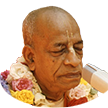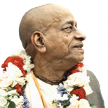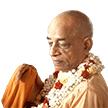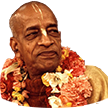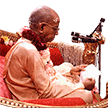Divisions of Human Society - an essential subject: Difference between revisions
(Created page with "Category:Essential Subjects <!----------------------- edit below this line -----------------------> <!------------------------ begin introduction text below --------------...") |
(Vanibot #0041: Moves Choose Another box to the end) |
||
| Line 2: | Line 2: | ||
<!----------------------- edit below this line -----------------------> | <!----------------------- edit below this line -----------------------> | ||
<!------------------------ begin introduction text below ------------------------> | <!------------------------ begin introduction text below ------------------------> | ||
The Lord is the creator of everything. Everything is born of Him, everything is sustained by Him, and everything, after annihilation, rests in Him. He is therefore the creator of the four divisions of human society, beginning with the intelligent class of men, technically called brāhmaṇas due to their being situated in the mode of goodness. Next is the administrative class, technically called the kṣatriyas due to their being situated in the mode of passion. The mercantile men, called the vaiśyas, are situated in the mixed modes of passion and ignorance, and the śūdras, or laborer class, are situated in the ignorant mode of material nature. In spite of His creating the four divisions of human society, Lord Kṛṣṇa does not belong to any of these divisions, because He is not one of the conditioned souls, a section of whom form human society. Human society is similar to any other animal society, but to elevate men from the animal status, the above-mentioned divisions are created by the Lord for the systematic development of Kṛṣṇa consciousness. | |||
Srila Prabhupada's books, lectures, conversations and letters offer a comprehensive presentation of this essential subject as seen in the Vaniquotes '''[[Vaniquotes:Category: | Srila Prabhupada's books, lectures, conversations and letters offer a comprehensive presentation of this essential subject as seen in the Vaniquotes '''[[Vaniquotes:Category:Divisions of Human Society|Divisions of Human Society]]''' category. An introduction from his books is given below in the following 8 quotes. | ||
<!-------- end introduction text and don't touch next three lines ---------> | <!-------- end introduction text and don't touch next three lines ---------> | ||
== Quotes from Srila Prabhupada's books == | == Quotes from Srila Prabhupada's books == | ||
<!----------------- edit quote boxes below this line -----------------> | <!----------------- edit quote boxes below this line -----------------> | ||
{{VaniQuotebox| | {{VaniQuotebox|All these divisions of human society are based on the particular nature of each individual person, not on the principle of birth|The four statuses and orders of human society—brāhmaṇas, kṣatriyas, vaiśyas and śūdras, as wall as brahmacārīs, gṛhasthas, vānaprasthas and sannyāsīs—are all divisions of quality, education, culture and spiritual advancement attained by practicing control of the mind and the senses. All these divisions are based on the particular nature of each individual person, not on the principle of birth. Birth is not mentioned in this verse because birth is immaterial. '''(Śrīmad-Bhāgavatam 3.7.29)'''}} | ||
{{VaniQuotebox| | {{VaniQuotebox|Because the scientific division of four varnas and four asramas is now being extinguished, the entire world is being governed by unwanted men who have no training in religion, politics or social order, and it is in a very deplorable condition|Because the scientific division of four varṇas and four āśramas is now being extinguished, the entire world is being governed by unwanted men who have no training in religion, politics or social order, and it is in a very deplorable condition. In the institution of four varṇas and four āśramas there are regular training principles for the different classes of men. '''(Śrīmad-Bhāgavatam 3.21.55)'''}} | ||
{{VaniQuotebox| | {{VaniQuotebox|Community projects for the four orders of human society, combined with family welfare activities, as they are set forth by the institution of sanatana-dharma|Community projects for the four orders of human society, combined with family welfare activities, as they are set forth by the institution of sanātana-dharma, or varṇāśrama-dharma, are designed to enable the human being to attain his ultimate salvation. Therefore, the breaking of the sanātana-dharma tradition by irresponsible leaders of society brings about chaos in that society, and consequently people forget the aim of life-Viṣṇu. Such leaders are called blind, and persons who follow such leaders are sure to be led into chaos. '''(Bhagavad-gītā 1.42)'''}} | ||
{{VaniQuotebox| | {{VaniQuotebox|Human society is similar to any other animal society, but to elevate men from the animal status, the above-mentioned divisions (Varnasrama) are created by the Lord for the systematic development of Krsna consciousness|Human society is similar to any other animal society, but to elevate men from the animal status, the above-mentioned divisions are created by the Lord for the systematic development of Kṛṣṇa consciousness. The tendency of a particular man toward work is determined by the modes of material nature which he has acquired. Such symptoms of life, according to the different modes of material nature, are described in the Eighteenth Chapter of this book. '''(Bhagavad-gītā 4.13)'''}} | ||
{{VaniQuotebox| | {{VaniQuotebox|In the system of sanatana-dharma, of four divisions of social life and four orders of progressive realization, there are ample opportunities and sufficient directions for a happy termination of the progressive life|In the system of sanātana-dharma, of four divisions of social life and four orders of progressive realization, there are ample opportunities and sufficient directions for a happy termination of the progressive life, and the sincere followers are advised therein to accept a voluntary life of renunciation in order to achieve the desired goal of life. If one is not accustomed to abiding by the life of renunciation and self-abnegation from the beginning, one should try to get into the habit at a later stage of life as recommended by Śrīla Śukadeva Gosvāmī, and that will help one to achieve the desired success. '''(Śrīmad-Bhāgavatam 2.2.4)'''}} | ||
{{VaniQuotebox| | {{VaniQuotebox|It is essential that society be divided into four groups of men. Brahmanas, ksatriyas, vaisyas and sudras|It is essential that society be divided into four groups of men-brāhmaṇas, kṣatriyas, vaiśyas and śūdras. Here we see that although Prahlāda was perfect in every respect, he nonetheless followed the instructions of the brāhmaṇas who performed the Vedic rituals. Therefore in society there must be a very intelligent class of leaders who are well versed in the Vedic knowledge so that they can guide the entire populace to follow the Vedic principles and thus gradually become most perfect and eligible to return home, back to Godhead. '''(Śrīmad-Bhāgavatam 7.10.24)'''}} | ||
{{VaniQuotebox| | {{VaniQuotebox|It is the king's duty to see that everyone perfectly executes the duties prescribed for the varna and asrama divisions of society. Besides that, as exemplified by King Prthu, he must develop the earth for the greatest possible production of food grains|A responsible king or chief executive has many responsible duties to attend to in ruling over the citizens. The most important duty of the monarch or the government is to perform various sacrifices as enjoined in the Vedic literatures. The next duty of the king is to see that every citizen executes the prescribed duties for his particular community. It is the king's duty to see that everyone perfectly executes the duties prescribed for the varṇa and āśrama divisions of society. Besides that, as exemplified by King Pṛthu, he must develop the earth for the greatest possible production of food grains. '''(Śrīmad-Bhāgavatam 4.21.7)'''}} | ||
{{VaniQuotebox| | {{VaniQuotebox|Sri Caitanya Mahaprabhu, or for that matter any pure devotee, never identifies with these social and spiritual divisions of life, for a devotee is always transcendental to these different gradations of society|Śrī Caitanya Mahāprabhu, or for that matter any pure devotee, never identifies with these social and spiritual divisions of life, for a devotee is always transcendental to these different gradations of society. Nevertheless, Lord Caitanya decided to accept sannyāsa on the grounds that when He became a sannyāsī everyone would show Him respect and in that way be favored. '''(Caitanya-caritāmṛta, Ādi-līlā 7.33)'''}} | ||
<!----------------- edit quote boxes above this line -----------------> | <!----------------- edit quote boxes above this line -----------------> | ||
''' | '''Divisions of Human Society - [[Vaniquotes:Category:Divisions of Human Society|explore more within this category]]'''. | ||
{{EsentialSubjectTotal}} | {{EsentialSubjectTotal}} | ||
<div style="float:left;"> | |||
{{EssentialSubjectnav}} | |||
</div> | |||
__NOTOC__ | __NOTOC__ | ||
__NOEDITSECTION__ | __NOEDITSECTION__ | ||
Latest revision as of 16:14, 22 November 2020
The Lord is the creator of everything. Everything is born of Him, everything is sustained by Him, and everything, after annihilation, rests in Him. He is therefore the creator of the four divisions of human society, beginning with the intelligent class of men, technically called brāhmaṇas due to their being situated in the mode of goodness. Next is the administrative class, technically called the kṣatriyas due to their being situated in the mode of passion. The mercantile men, called the vaiśyas, are situated in the mixed modes of passion and ignorance, and the śūdras, or laborer class, are situated in the ignorant mode of material nature. In spite of His creating the four divisions of human society, Lord Kṛṣṇa does not belong to any of these divisions, because He is not one of the conditioned souls, a section of whom form human society. Human society is similar to any other animal society, but to elevate men from the animal status, the above-mentioned divisions are created by the Lord for the systematic development of Kṛṣṇa consciousness.
Srila Prabhupada's books, lectures, conversations and letters offer a comprehensive presentation of this essential subject as seen in the Vaniquotes Divisions of Human Society category. An introduction from his books is given below in the following 8 quotes.
Quotes from Srila Prabhupada's books
Divisions of Human Society - explore more within this category.
Vanipedia has now over 903 introductory articles compiled from Srila Prabhupada's books under the series titled Essential Subjects. All these articles can be seen in the Table of Content on the right side of this article and also here in this Umbrella Category. Browse through them to relish the breadth and depth of Srila Prabhupada's teachings - There is a subject for everyone.
